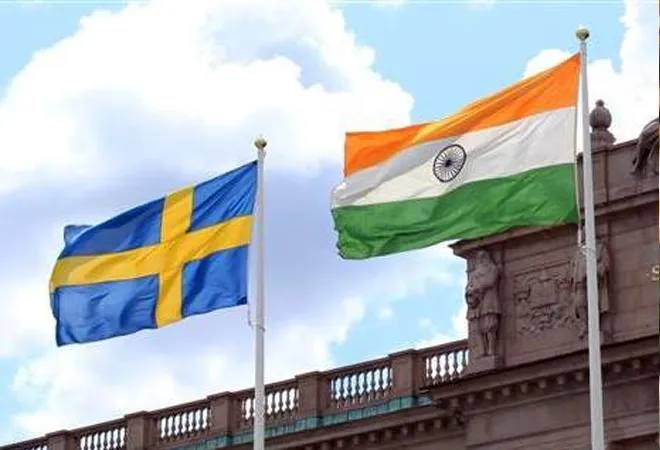
The bilateral relations between India and Sweden has been witnessing momentous upswing in recent years on multifarious dimensions. With the diplomatic ties between New Delhi and Stockholm already established in 1949, what is critically significant is the metamorphosis of strategic convergence in recent times that has resulted in robust cooperation of the two countries in various regional and international fora. The foundation of such strong partnership and longstanding cordiality between the two countries are
based on shared values of democracy, rule of law, pluralism, institutional affinity, equality, freedom of speech, and respect for human rights.
The historic visit of Prime Minister Narendra Modi to Sweden in 2018, the first of its kind after nearly three decades, has been a turning point in taking the bilateral relationship to the next stage while expanding and strengthening the contours of strategic cooperation like never before. The
virtual summit recently held on March 2021 between Prime Minister Narendra Modi and his Swedish counterpart Stefan Lofven has enhanced the momentum like never before towards further consolidation of strategic convergence between the two countries on issues related to defence, counterterrorism, peace and security, climate change, science and technology, start-up innovation, medical innovation, and industry integration. With around 250 Swedish companies actively operating in India in various sectors like defence, heavy machinery and equipment, health and life sciences, clean technology, and auto industry in conjunction with simultaneously, around 75 Indian companies also fully active in Sweden, the foundations for
robust strategic cooperation between New Delhi and Stockholm is deeply ingrained.
The historic visit of Prime Minister Narendra Modi to Sweden in 2018, the first of its kind after nearly three decades, has been a turning point in taking the bilateral relationship to the next stage while expanding and strengthening the contours of strategic cooperation like never before.
Keeping in perspective the emerging global challenges, especially in the context of fractured post COVID-19 world order in association with rapidly evolving strategic rift lines and perceivable geopolitical disequilibrium, it can be argued that such changing dynamics provide momentous opportunities for New Delhi and Stockholm to fill the geostrategic void both in regional and transglobal dimensions allowing the two countries to be committed to working together in concert with the international community as responsible and trustworthy partners and in conformity to the established rules, norms and tenets of reformed multilateralism. The
strategic importance of transformational relationship between India and Sweden is increasingly being reflected at the regional and global levels as noted by Prime Minister Modi and his Swedish counterpart. On a larger geopolitical nomenclature, it is further asserted that the heightened trajectory of strategic cooperation between India and Sweden on a number of well-founded mutually beneficial priorities going to be profoundly impactful on bilateral, regional, and multilateral levels while expanding the scope and extent of
“India-Nordic” strategic engagement as a very special exclusive relationship in conjunction with determining the trajectory of overarching architecture of India–EU partnership.
At the
recent virtual summit PM Modi and PM Lofven have deliberated on a strategic roadmap that is dynamic, proactive, and timely in strengthening bilateral cooperation on a number of pressing issues that have credible impact on regional and transglobal dimensions under a system of reformed multilateralism and transparent global governance. Apart from deciding to expand defence and security partnership the two leaders called for boosting cooperation on climate change, high-tech and innovation partnership, research and development, healthcare innovation, trade and investment, leadership skill and industry transition. In each of these focus areas India and Sweden have rich and diverse proficiency based on resource endowment, mobilisation, and capacity enhancement implying shared politico-socio-economic and technological progress.
Apart from deciding to expand defence and security partnership the two leaders called for boosting cooperation on climate change, high-tech and innovation partnership, research and development, healthcare innovation, trade and investment, leadership skill and industry transition.
Having said that during the recently held summit the two countries have prudently recognised climate change as strategic focus area of top priority wherein both New Delhi and Stockholm can work together in expanding the scope and extent of meaningful collaboration in both regional and trans-continental paradigms. As India and Sweden traditionally share similar perspectives in creating healthy balance between nature and humanity for sustainable development, the present juncture in the wake of COVID-19 global pandemic is undoubtedly the most opportune moment for making credible collaborative intervention in preventing global warming, establishing harmony with nature, and saving planet Earth while complying with the goals and commitments made as signatories of the Paris Agreement 2015. India’s renewable energy capacity, registering 162 percent increase in last five years, has been a remarkable realisation that has further enhanced the potential of mutually beneficial
cooperation between New Delhi and Stockholm in the domain of clean energy technologies, thereby, immensely impacting the trajectory of climate action.
Moreover,
India’s leadership role in delineating the success of India-France led International Solar Alliance (ISA) comprising 88 signatories is globally highly acclaimed in terms of mobilising resources towards promoting research and development in renewable energy. In this context Sweden’s recent decision to join ISA is a vital development that is imperative towards developing synergy in harnessing advanced green technological pursuits. With the two prime ministers emphasising
heightened cooperation in innovation and clean technology for sustainable development and effective climate action in conjunction with India’s call for save planet Earth with a spirit of Trusteeship, the future roadmap for viable action plan is distinctly delineated in the form of making collaborative credible intervention. It is envisioned that the two countries’ consistent track record of commitment, concern, and robust initiatives towards environmental safeguard, and governance are going to be paramount in not only enhancing
India-Sweden partnership on climate action but also strengthening the two countries’ joint initiative — “Leadership Group for Industry Transition (LeadIT)” — that is potentially transformational in its unique perspective in pursuing the goals of net-zero carbon emissions by 2050).
The two prime ministers have reiterated that “Innovation for a more sustainable future” is at the heart of the India-Sweden partnership.
Another critical focus area profoundly impacting robust bilateral cooperation between New Delhi and Stockholm having global ramifications is in the domain of innovation, science, technology, and industrial integration. The two prime ministers have reiterated that “Innovation for a more sustainable future” is at the heart of the India-Sweden partnership. In that context the two countries are consolidating deepened collaboration within the contours of ongoing successful Joint Action Plan and multi-stakeholder Innovation Partnership that is based on win-win strategy allowing for shared economic progress.
Critical areas of cooperation here include renewable energy, health and life sciences, start-ups, manufacturing, smart cities urban transportation, and waste management, each of which is potentially transformational in enhancing the much-anticipated win-win synergy between the two countries and implying shared economic progress. The heightened partnership regarding health innovation that the two countries envision is of strategic significance, especially in an era of COVID-19 pandemic, implying sustainable capacity building in public health, vaccine development, medico-scientific innovation in conjunction with providing stable supply chain network affecting both, bilateral and multilateral nomenclatures. In that context the vision for creation of
Sweden-India Health Hub at AIIMS-Jodhpur) is going to be a game-changer in areas of public health management capacity building along with furthering cutting-edge medico-scientific research and technology proficiency serving the shared interests of the people of the two countries and beyond. Regarding COVID-19 vaccine development, both New Delhi and Stockholm are at the forefront in the development of “Covishield” vaccine wherein the Serum Institute of India and Swedish pharma giant AstraZeneca are collaborating in vaccine production and rollout, as India is marching ahead full steam with the largest vaccination drive in the world. Recently Swedish envoy to India has openly
hailed the efforts of India in the domain of COVID-19 vaccine development and distribution, thereby, becoming the pharmacy of the world. At the virtual summit,
India’s pivotal role in vaccine production and distribution of 48 million doses to more than 50 countries has been acclaimed by Sweden, while reiterating the two countries’ continued commitment to fight global pandemic together and in concert with international community.
The two prime ministers have also agreed that
defence and security cooperation constitute cornerstone of longstanding bilateral relationship between New Delhi and Stockholm. Prime Minister Modi has invited Swedish defence companies to invest and participate in “Make in India” programme, especially in the two Defence Production Corridors in Tamil Nadu and Uttar Pradesh. Enhanced partnership encompassing defence production, research and development, cybersecurity cooperation, defence technology exchange culminated by General Security Agreement in 2019 is momentous to bolster bilateral defence cooperation having far-reaching ramifications at the regional and multilateral paradigms. It is critically important to note that under the
Joint Action Plan, both sides have agreed to explore revamped industry partnership to develop supply chains for small and medium-sized enterprises with major defence and aerospace original equipment manufacturers, smart city grids, and transit-oriented urban transportation on a sustainable basis. All such endeavours constitute multidimensional strategic engagements that will not only be mutually beneficial in accelerating bilateral trade and investment scenario but also expected to embolden shared economic progress under mutually beneficial nomenclature.
Enhanced partnership encompassing defence production, research and development, cybersecurity cooperation, defence technology exchange culminated by General Security Agreement in 2019 is momentous to bolster bilateral defence cooperation having far-reaching ramifications at the regional and multilateral paradigms.
With India and Sweden embarking on heightened trajectory of cooperation on several priority areas of mutual concern has opened new vistas of robust partnership while strengthening the tenets of bilateral relationship. The ongoing momentum of consolidation of strategic interests between New Delhi and Stockholm in the aftermath of March 2021 summit is expected to make impeccable imprint in regional and global levels especially in defining the post COVID-19 geopolitical chessboard, especially in the context of India ascending to G-20 presidency in 2023. Such rapidly evolving dynamics will surely have far-reaching ramifications on a larger ambit in not only emboldening contours of India-Nordic relations but also the broader dimensions of upcoming India-EU summit scheduled in May 2021.
The views expressed above belong to the author(s). ORF research and analyses now available on Telegram! Click here to access our curated content — blogs, longforms and interviews.



 The bilateral relations between India and Sweden has been witnessing momentous upswing in recent years on multifarious dimensions. With the diplomatic ties between New Delhi and Stockholm already established in 1949, what is critically significant is the metamorphosis of strategic convergence in recent times that has resulted in robust cooperation of the two countries in various regional and international fora. The foundation of such strong partnership and longstanding cordiality between the two countries are
The bilateral relations between India and Sweden has been witnessing momentous upswing in recent years on multifarious dimensions. With the diplomatic ties between New Delhi and Stockholm already established in 1949, what is critically significant is the metamorphosis of strategic convergence in recent times that has resulted in robust cooperation of the two countries in various regional and international fora. The foundation of such strong partnership and longstanding cordiality between the two countries are  PREV
PREV


